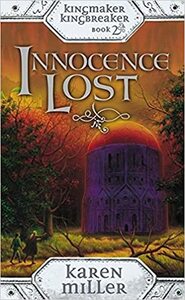Take a photo of a barcode or cover
adventurous
medium-paced
Plot or Character Driven:
Plot
Strong character development:
No
Loveable characters:
No
Diverse cast of characters:
No
Flaws of characters a main focus:
Yes
adventurous
emotional
medium-paced
The Innocent Mage wasn't a bad read but a vast majority of it was filler. It was a nice way to introduce the cast but it drug on for a rather long time before actually getting to the "meat" of the book. The Awakened Mage feels the same way. It drags on for so long, in fact, that over halfway through the book I began to wonder if there would be a third installment simply because I couldn't imagine this book wrapping up in time. I was shocked when I realized that this is, indeed, the end of this part of the story; I was on the edge of my seat wondering how Miller pulled it off.
It has a little more to it than The Innocent Mage but way too much time is spent inside the minds of the characters rather than on the main plot.
What's even more disappointing is that, despite the large amount of time the author dedicates to everything but actively pushing the main plot, most of the characters fail to grow. The main character begins the series as an annoying jerk and is even more frustrating by the end of the tale. He's no hero and yet he's referred to as a good guy all throughout the series. Having everyone say he's a good guy isn't enough; you actually need to show it which Miller failed to do.
Then there is the female lead, Dathne, who starts out as a strong, intelligent woman but turns into a blathering fool. Her dialogue by the end of the series is so unlike her it's uncomfortable to read.
The only character that really makes much of a change is Darran. I don't think that spending this much time on "filler" should result in undeveloped characters... So much potential wasted. I don't want to hate my hero! Give your readers something - a redeemable quality, an interesting backstory, anything.
Also an issue is the fact that all of this magic exists and it all ties together somehow and yet by the end of this book, you aren't really sure how. You know this does this and that does that but have no idea why. You don't understand why Barl made the decisions that she did or why she was treated like a holy figure.. And once you realize why Morg is so evil, you can't help but go, "What? Really? That's it?!"
I think the idea is interesting but the execution was sloppy. If you want me to invest more time in reading your work, give me a good reason to. Between the two books you are already looking at over 1200 pages; I don't think I should have to delve into yet another installment to understand certain plot points when the first two books were so disappointing.
It has a little more to it than The Innocent Mage but way too much time is spent inside the minds of the characters rather than on the main plot.
What's even more disappointing is that, despite the large amount of time the author dedicates to everything but actively pushing the main plot, most of the characters fail to grow. The main character begins the series as an annoying jerk and is even more frustrating by the end of the tale. He's no hero and yet he's referred to as a good guy all throughout the series. Having everyone say he's a good guy isn't enough; you actually need to show it which Miller failed to do.
Then there is the female lead, Dathne, who starts out as a strong, intelligent woman but turns into a blathering fool. Her dialogue by the end of the series is so unlike her it's uncomfortable to read.
The only character that really makes much of a change is Darran. I don't think that spending this much time on "filler" should result in undeveloped characters... So much potential wasted. I don't want to hate my hero! Give your readers something - a redeemable quality, an interesting backstory, anything.
Also an issue is the fact that all of this magic exists and it all ties together somehow and yet by the end of this book, you aren't really sure how. You know this does this and that does that but have no idea why. You don't understand why Barl made the decisions that she did or why she was treated like a holy figure.. And once you realize why Morg is so evil, you can't help but go, "What? Really? That's it?!"
I think the idea is interesting but the execution was sloppy. If you want me to invest more time in reading your work, give me a good reason to. Between the two books you are already looking at over 1200 pages; I don't think I should have to delve into yet another installment to understand certain plot points when the first two books were so disappointing.
According to Karen Miller, the word "prophecy" is synonymous with six hundred year old "conspiracy." By the end of this book, I felt myself agreeing wholeheartedly with the alleged main protagonist Asher. If one more person mentioned the word "prophecy" I was going to somehow find a way to reach into the pages and choke the characters to death.
When I think "prophecy," I think of Nostradamus. I think of something someone predicted was going to happen, spoke of it or wrote it down once upon a time, and then it got forgotten. Generally for centuries at a time. Then one day something happens that seems mighty familiar, and some blow-hard who had it in his head to read some morbid poetry some long dead dude wrote once upon a time claims, "Hey! He predicted this! How come nobody saw it coming? It happened just like he said!" By the time prophecy happens, it's too late for anybody to be prepared for it because, well, it happened.
According to these books, prophecy is something entirely different. It's more like a religion. Then again, religion in this book is based off a woman who died six hundred years previous who wasn't really anyone miraculous. She wasn't born from a virgin, and she didn't preach anything other than "thou shalt not do magic unless ye be Doranen like I was." So what did all these people who weren't Doranen like she was do? They believed the words of some seer about catastrophe coming and her people being to blame and created a secret society to keep an eye on current events for generations to come to make sure it happened.
Again, when I think "prophecy," what I don't envision are a bunch of people orchestrating events in their favor just to make it so. I don't see people knowing about it for six hundred years and then some day the descendant of the first guy who said it having a vision of some other guy and claiming him to be The One. All through these books, everybody but The One knows that he's The One. Well, at least everybody within the super secret society of prophecy believers.
Once again I was stuck with a fantasy novel riddled with cliches, and the ending didn't really surprise me all that much. Prophecy held true as no one could have it expected it, and I confess I teared up a little. But that's only because everybody lived happily ever after... Except the one character who was most likable through the entire two book series. I still didn't like Asher very much, though admittedly I could sympathize with him in some parts.
And, again, I'm still not sure why I liked this book enough to read it through to the very end. It's like the pages themselves, for both books, were magically enchanted to keep me reading. I still feel like I've read this story somewhere else once before. "A new twist on an old tale." I still get that feeling. Like a prophecy I heard once upon a time but just can't completely remember in all its mysterious detail.
When I think "prophecy," I think of Nostradamus. I think of something someone predicted was going to happen, spoke of it or wrote it down once upon a time, and then it got forgotten. Generally for centuries at a time. Then one day something happens that seems mighty familiar, and some blow-hard who had it in his head to read some morbid poetry some long dead dude wrote once upon a time claims, "Hey! He predicted this! How come nobody saw it coming? It happened just like he said!" By the time prophecy happens, it's too late for anybody to be prepared for it because, well, it happened.
According to these books, prophecy is something entirely different. It's more like a religion. Then again, religion in this book is based off a woman who died six hundred years previous who wasn't really anyone miraculous. She wasn't born from a virgin, and she didn't preach anything other than "thou shalt not do magic unless ye be Doranen like I was." So what did all these people who weren't Doranen like she was do? They believed the words of some seer about catastrophe coming and her people being to blame and created a secret society to keep an eye on current events for generations to come to make sure it happened.
Again, when I think "prophecy," what I don't envision are a bunch of people orchestrating events in their favor just to make it so. I don't see people knowing about it for six hundred years and then some day the descendant of the first guy who said it having a vision of some other guy and claiming him to be The One. All through these books, everybody but The One knows that he's The One. Well, at least everybody within the super secret society of prophecy believers.
Once again I was stuck with a fantasy novel riddled with cliches, and the ending didn't really surprise me all that much. Prophecy held true as no one could have it expected it, and I confess I teared up a little. But that's only because everybody lived happily ever after... Except the one character who was most likable through the entire two book series. I still didn't like Asher very much, though admittedly I could sympathize with him in some parts.
And, again, I'm still not sure why I liked this book enough to read it through to the very end. It's like the pages themselves, for both books, were magically enchanted to keep me reading. I still feel like I've read this story somewhere else once before. "A new twist on an old tale." I still get that feeling. Like a prophecy I heard once upon a time but just can't completely remember in all its mysterious detail.
This is the second book in the Kingmaker-Kingbreaker Saga. It is the continued story of Asher and Prince Gar as they are trying - unknowingly - to fight an ancient evil that is trying to destroy the world of their respective people. In this struggle they will have to oversome heartbreaks, betrayals, greed and other weaknesses.
This final story in the series is enjoyable, but the resolution is a bit simplistic and does not bring much to the genre. The story continues with the next series "The Fisherman's Children" where Miller is telling the story of Asher's descendants.
This final story in the series is enjoyable, but the resolution is a bit simplistic and does not bring much to the genre. The story continues with the next series "The Fisherman's Children" where Miller is telling the story of Asher's descendants.
adventurous
slow-paced
Plot or Character Driven:
Plot
Strong character development:
Yes
Loveable characters:
Yes
Diverse cast of characters:
No
Flaws of characters a main focus:
Complicated
[2.5 Stars] This duology should have just been a standalone. There are probably 400 pages of fluff that could have been removed between the two books, and then it would have been great. Only the last 100 pages or so of this volume we're actually interesting to me. The ended was alright, so at least I'm satisfied with that.
This was a hard book to rate (and a very slow book to read!)
The author's prose is very pedestrian and slow and she often has a terrible sense of when extra detail is needed and when it isn't. The characters are very broadly drawn and the world-building is exceedingly simplistic.
The good characters are a little bit more than cutouts--they do think for themselves and are often doing things they aren't very happy about. The evil characters are ridiculous, mustachio-twirling villains...
She creates a somewhat interesting dynamic in describing a colonial society dominated by a small magic-using caste, but also forcing the rulers of the caste to do weather-magic which is quite painful and harmful to them. However, she doesn't explore the ramifications of this sort of society much at all.
What did work was turning the "chosen one" narrative on it's head by making the prophesied character a total thuggish pain in the ass. (Of course, this also made the book harder to like.) The real protagonist of the book is the woman who is supposed to support him...except that in the end she (of course) falls in love with him and also plays no real part in the resolution of the crisis.
Bad book. Won't be reading anything else by her.
Reader on the audio version did a great job.
The author's prose is very pedestrian and slow and she often has a terrible sense of when extra detail is needed and when it isn't. The characters are very broadly drawn and the world-building is exceedingly simplistic.
The good characters are a little bit more than cutouts--they do think for themselves and are often doing things they aren't very happy about. The evil characters are ridiculous, mustachio-twirling villains...
She creates a somewhat interesting dynamic in describing a colonial society dominated by a small magic-using caste, but also forcing the rulers of the caste to do weather-magic which is quite painful and harmful to them. However, she doesn't explore the ramifications of this sort of society much at all.
What did work was turning the "chosen one" narrative on it's head by making the prophesied character a total thuggish pain in the ass. (Of course, this also made the book harder to like.) The real protagonist of the book is the woman who is supposed to support him...except that in the end she (of course) falls in love with him and also plays no real part in the resolution of the crisis.
Bad book. Won't be reading anything else by her.
Reader on the audio version did a great job.
adventurous
fast-paced
Plot or Character Driven:
Character
Loveable characters:
Complicated
Diverse cast of characters:
Yes
Flaws of characters a main focus:
No






